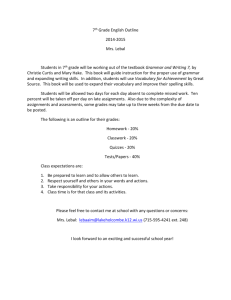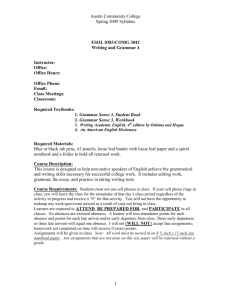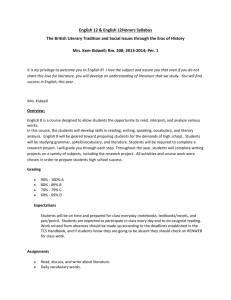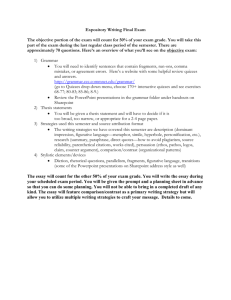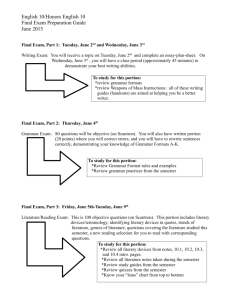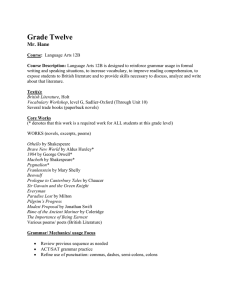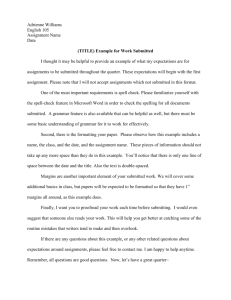Second Semester Course Schedule
advertisement
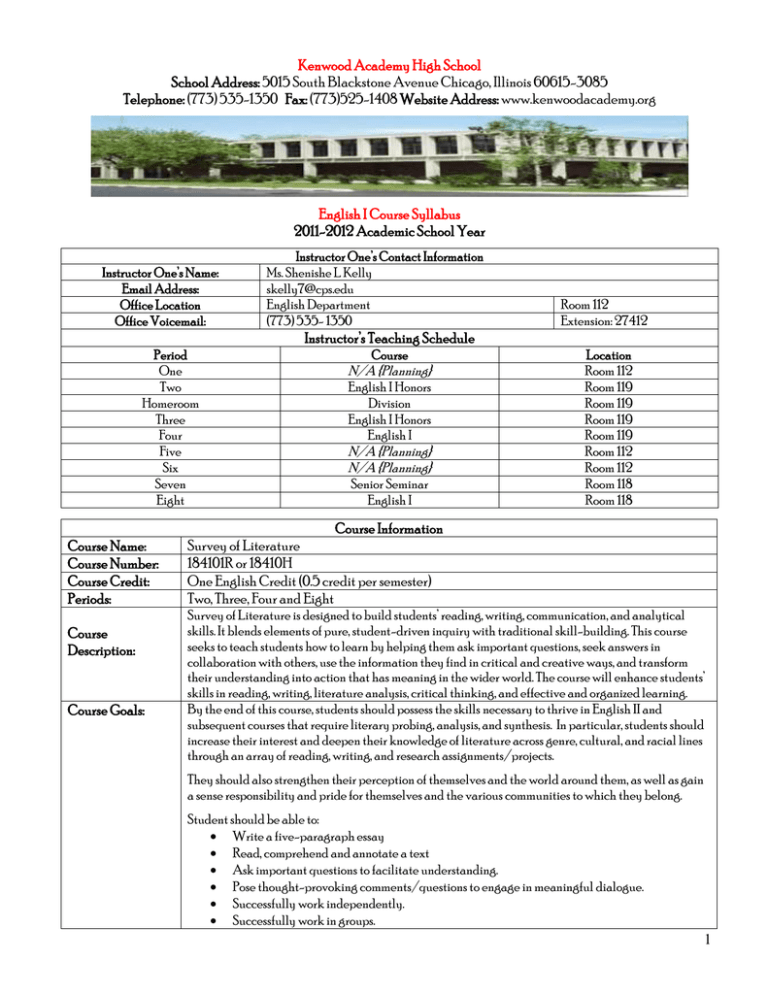
Kenwood Academy High School
School Address: 5015 South Blackstone Avenue Chicago, Illinois 60615-3085
Telephone: (773) 535-1350 Fax: (773)525-1408 Website Address: www.kenwoodacademy.org
English I Course Syllabus
2011-2012 Academic School Year
Instructor One’s Name:
Email Address:
Office Location
Office Voicemail:
Instructor One’s Contact Information
Ms. Shenishe L Kelly
skelly7@cps.edu
English Department
(773) 535- 1350
Room 112
Extension: 27412
Instructor’s Teaching Schedule
Period
One
Two
Homeroom
Three
Four
Five
Six
Seven
Eight
Course Name:
Course Number:
Course Credit:
Periods:
Course
Description:
Course Goals:
Course
N/A {Planning}
English I Honors
Division
English I Honors
English I
N/A {Planning}
N/A {Planning}
Senior Seminar
English I
Location
Room 112
Room 119
Room 119
Room 119
Room 119
Room 112
Room 112
Room 118
Room 118
Course Information
Survey of Literature
184101R or 18410H
One English Credit (0.5 credit per semester)
Two, Three, Four and Eight
Survey of Literature is designed to build students’ reading, writing, communication, and analytical
skills. It blends elements of pure, student-driven inquiry with traditional skill-building. This course
seeks to teach students how to learn by helping them ask important questions, seek answers in
collaboration with others, use the information they find in critical and creative ways, and transform
their understanding into action that has meaning in the wider world. The course will enhance students’
skills in reading, writing, literature analysis, critical thinking, and effective and organized learning.
By the end of this course, students should possess the skills necessary to thrive in English II and
subsequent courses that require literary probing, analysis, and synthesis. In particular, students should
increase their interest and deepen their knowledge of literature across genre, cultural, and racial lines
through an array of reading, writing, and research assignments/projects.
They should also strengthen their perception of themselves and the world around them, as well as gain
a sense responsibility and pride for themselves and the various communities to which they belong.
Student should be able to:
Write a five-paragraph essay
Read, comprehend and annotate a text
Ask important questions to facilitate understanding.
Pose thought-provoking comments/questions to engage in meaningful dialogue.
Successfully work independently.
Successfully work in groups.
1
Course Texts
The Language of Literature
Writer’s Choice (Grammar Text)
Anderson, Laurie H. Speak.
Angelou, Maya. I Know Why the Caged Bird Sings.
Coolidge, Olivia. Greek Myths.
Evslin, Bernard. Heroes, Gods, and Monsters of the
Greek Myths.
Gaines, Ernest. Lesson before Dying.
Hamilton, Edith. Mythology.
Herzberg, Marx John. Myths and their Meaning
Lee, Harper. To Kill a Mockingbird.
Martinez, Victor. Parrot in the Oven: Mi Vida
Rose, Reginald. 12 Angry Men.
Shakespeare, William. Romeo and Juliet.
Standards—This course addresses the following standards:
College Readiness Standards
English:
Column 1: topic development
Column 2: organization, unity, and coherence
Column 3: word choice, style, tone, clarity, and economy
Column 4: sentence structure and formation
Column 5: punctuation
Column 5: using language
Reading:
Column 1: main ideas
Column 2: supporting details
Column 3: sequencing, comparisons, cause/effect
Column 4: meanings of words
Column 5: generalizations and conclusions
Writing:
Column 1: expressing judgment
Column 2: focusing on a topic
Column 3: developing a position
Column 4: organizing ideas
Illinois Learning Standards
State standard 1: Read with understanding and fluency.
State standard 2: Read and understand literature representative
of various societies, eras, and ideas.
State standard 3: Write to communicate for a variety of purposes.
State standard 4: Listen and speak effectively in a variety of
situations.
State standard 5: Use the language arts to acquire, assess, and
communicate information.
A full list of English CRS is available at:
http://www.act.org/standard/planact/english/index.html
A full list of Reading CRS is available at:
http://www.act.org/standard/planact/reading/index.html
A full list of Writing CRS is available at:
http://www.act.org/standard/planact/writing/index.html
A detailed breakdown of the Illinois standards is available at:
http://www.isbe.net/ils
Grading Scale
A=100-90
B= 89-80
C=79-70
D=69-60
F=59-below
Category Weights
Category
Weight
Participation
Literary Analysis (Assignments)
Grammar (Assignments)
Reading Comprehension(Assignments)
Projects
10-Week Exam
Writing
Semester Exam
10%
10%
10%
10%
10%
10%
25%
15%
Required Course Materials:
three-ring binder
dividers (8-tab)
notebook/journal
college ruled loose-leaf notebook paper
Homework:
pens (black or blue)
highlighters
pocket dictionary & thesaurus
USB flash drive
Homework is an essential way to reinforce concepts and prepare for the next day’s class. It is expected that
all homework will be done on time, as assigned. Previous absence is not an excuse for arriving at class
unprepared. Please utilize the Kenwood website and/or your classmates to ensure you are able to arrive to
class prepared. Missed homework must still be completed, because all assignments are essential parts of the
instructional process. However, late assignments may not receive full credit.
2
Attendance/
Tardiness Policy:
Students are expected to be in class and arrive on time daily. Please refer to the Behavior Syllabus for more
specific information regarding this policy.
Late Work
Policy:
Students are expected to submit assignments on time. Most deadlines are non-negotiable. That being said,
missed assignments must still be completed, because all assignments are essential parts of the instructional
process. However, late assignments may not receive full credit. Late assignments are accepted at the
discretion of the teacher.
Guide to
Studying:
Studying is essential to academic success. Students are expected to spend a minimum of 30 minutes daily
studying for this course. This includes, but is not limited to:
Communicating with the instructor regarding academic and social concerns in a timely manner
Completing all assignments ( homework, class work, readings, projects, quizzes, exams)
Correcting errors on previous assignments and assessments
Forming study groups with course mates
Reviewing class notes and handouts
Attending offered tutorials sessions
Reading (to learn and for pleasure)
Keeping an organized notebook
Learning new vocabulary
Journaling/Free-writing
Classroom Rules:
In sum, students are expected respect themselves, each other, their teachers and the learning environment
at all times. Specifically, students are expected to:
● Attend class daily, arrive on time, and always be prepared for class.
● Be respectful of each other at all times. This includes only using appropriate language and
responding politely when there are differences of opinion.
● Refrain from touching, taking or disturbing the possessions of others without their expressed consent.
● Refrain from eating or drinking unapproved products during class.
● Adhere to all other school and district policies following dress code, wearing student ID, and
refraining from using cell phones and other electronic devices.
First Semester Course Schedule
Second Semester, Quarter One: September 6, 2011-November 10, 2011
In-Service Days: September 23, 2011, October 28, 2011
Holidays: October 10, 2011 and November 11, 2011
Overcoming Obstacles—Learning to Survive
Week(s)
1-2
3-6
Content
“What is dignity, and how do you attain it?”
Text: A Lesson Before Dying
Literary Analysis: Theme
Reading: Main Idea, Author’s Purpose &
Techniques, and Meaning of Words
Grammar: Parts of a Sentence
Writing: Sentences and Paragraphs
“Is revenge ever justified?”
Text: selected short stories
Literary Analysis: Theme, Plot Elements and
Character Traits
Reading: Main Idea, Author’s Purpose &
Techniques, Meaning of Words, Sequential
Order, and Annotation
Grammar: Parts of Speech
CRS
Reading 1
English 3, 5
Writing 1,4
Reading 1,2,3,4
English 3, 4, 5
Evidence/Assessment
Review summer reading packet
Grammar quizzes
Brief Constructed Responses
A Lesson Before Dying Jigsaw Project
Paragraph: Themes from A Lesson
Before Dying
Selected response reading assessment
Grammar quizzes
Extended Constructed Response
Graphic Organizers: Literary Elements
Paragraph writing: personal experiences,
response to essential question
Notebook and Folder checks
3
7-10
Writing: Sentences and Paragraphs—Focus,
Organization, and Development (Ideas and
Content)
“What does it take to be a survivor?”
Text: Speak
Literary Analysis: Symbolism (Objects,
Characters, Actions, and Places), Theme, and
Plot Elements
Reading: Main Ideas &Supporting Details
Grammar: Direct & Indirect Objects, and
Prepositional Phrases
Writing: Narrative Essay
Writing 2, 4, 5
Unit self-assessment
Reading 1,2
Timed reading assessment
Timed writing assessment
Grammar quizzes
Narrative Essay
Life Graph
Notebook and Folder checks
English 1,2
Writing 5, 6
First Semester, Quarter Two: November 14, 2011 – January 27, 2012
Holidays: November 24-25, 2011; December 23- January6, 2011; January 16, 2012
Report Card Pick-up: November 17, 2011
Overcoming Obstacles—Learning to Live
Week(s)
11-12
13-15
16-19
Content
“What is your purpose? What do you believe
in and why?”
Text(s): Heroes, Gods, and Monsters of the
Greek Myth; Mythology; Myths and their
Meaning
Literary Analysis: Theme, Conflict, Irony, and
Characterization
Reading: Cause/Effect Relationships,
Compare/Contrast Relationships, and
Meaning of Words
Grammar: Nouns/ Possessives, Plurals
Writing:
“What is a poet’s job?”
Text: The Language of Literature and
selected poems
Literary: Speaker, Figurative Language,
Sensory Language, Tone/Mood, Symbols, and
Theme
Reading: Word analysis and recognition,
multiple meaning words, literary techniques,
author’s style, author’s techniques, making
generalization, drawing conclusions, and
main idea
Grammar: Capitalization, Punctuation
(Apostrophes , end punctuation, semi-colons)
Writing: Poetry
“What are the rules for different types of
relationships?”
Drama: Shakespeare’s Romeo and Juliet
Reading: Cause/Effect Relationships,
Meanings of Words
Grammar: Punctuation (Colons, Commas, and
appositives
Writing: Analytical and the revision process
CRS
Evidence/Assessments
Reading 1-5
English 1-5
Writing 2,4,5
Write a creation myth
Grammar quizzes
Story Boards
Grammar quizzes
Poetry explications
Grammar quizzes
Student poetry
Notebook and Folder checks
Poetry Portfolio Project
Reading 1-5
English 1-5
Writing 2,4,5
Reading 1,2,4
English 1,2,4,5, 6
Writing 2,3,4,5
Analytical Essay: Romeo and Juliet
Weekly grammar quizzes
Cause/Effect and Sequence of Events
chains
Notebook and Folder checks
Semester Exam
4
Second Semester Course Schedule
Second Semester, Quarter Three: January 30, 2012-April13, 2012
In-Service Day: February 3, 2012
Holidays: February 13, 2012, February 20, 2012, March 5, 2012, April 2-6, 2012
Seeking Social Justice: Fear of the Unknown
Week(s)
20-22
23-27
28-30
Content
“What are we willing to fight for? What are we
willing to fight against?
Text: Twelve Angry Men
Literary Analysis: Theme, Conflict, Irony,
Figurative Language, Characterization, and
Dramatic Elements
Reading: Cause/Effect Relationships,
Compare/Contrast Relationships, Sequencing,
and Meaning of Words
Grammar: Possessive and Plural Nouns
Writing: Pre-writing, drafting, revising, editing,
and publishing
“What are we most afraid of? How does fear
impact our lives?
Text: To Kill a Mockingbird
Literary Analysis: Symbolism, Theme, Conflict,
Irony, Figurative Language, Characterization,
and Dramatic Elements
Reading: Significant details, Author’s Purpose,
Cause/Effect Relationships,
Compare/Contrast Relationships, Sequencing,
Meaning of Words, and Reading with Fluency
Grammar: Possessive and Plural Nouns and
Pronoun-Antecedent agreement
Writing: Compare/Contrast, Argumentation,
and Six Traits of Writing
Text: N/A—News and journal articles
Literary Analysis: N/A
Reading: Main idea, Significant details,
Author’s purpose, Cause/Effect Relationships,
Compare/Contrast Relationships, Sequencing,
Meaning of Words, Reading with Fluency
Grammar: Pronoun-Antecedent agreement
Writing: Research paper/presentation, and
citations
CRS
Evidence/Assessment
English 2,4,5
Writing 1-5
Graphic Organizers
Summary Frames
Cause/Effect Sequencing Chain
Comparison/Contrast writing
Grammar Quizzes
Reading 1,2,4
Weekly reading quizzes
Exit tickets
Reading comprehension exam
Oxford Style Debates
Research Presentation
Grammar Quizzes
Reading 1,2,4
English 2,4,5
Writing 1-5
Reading 1-5
English 1-5
Writing 1-5
Second Semester, Quarter Four: April 16, 2012 – June 15, 2012
In-Service Day: June 14, 2012
Holidays: May 28, 2012;
Report Card Pick-Up: April 19, 2012 and June 15, 2012
Seeking Social Justice: Fear of the Known
Week(s)
31-34
Content
Text: I Know Why the Caged Bird Sings or
Martinez, Victor. Parrot in the Oven: Mi Vida
Literary Analysis: Symbolism, Theme,
Conflict, Figurative Language, and
Characterization
Reading: Main Idea, Significant Details,
CRS
Reading 1-5
English 1-5
Writing 1-5
Evidence/Assessments
Identity Project
Grammar quizzes
5
35-38
Cause/Effect Relationships, Compare,
Contrast Relationships, Sequencing, Meaning
of Words, Reading with Fluency
Grammar: Verb Tense Shifts
Writing: Expository
Text(s): selected short stories in the science
fiction and fantasy genres or a graphic novel
Literary Analysis: Main Idea, Significant
Details, Cause/Effect Relationships,
Compare, Contrast Relationships,
Sequencing, Meaning of Words, Reading with
Fluency
Reading: Main Idea, Significant Details,
Cause/Effect Relationships, Compare,
Contrast Relationships, Sequencing, Meaning
of Words, Reading with Fluency
Grammar: Verb Tense Shifts
Writing: Six Traits of Writing
Reading 1-5
English 1-5
Graphic Organizers
Story Boards
Grammar quizzes
Culminating Writing Project
Writing 1-5
6
Confirmation of Receipt of Survey of Literature Syllabus
---------------------------------------------------------------------------------------------------Acknowledgement: Signing below confirms that you have read and fully understand the expectations and
requirements outlined in the Survey of Literature syllabus.
Student Name: ______________________________________________ Date: ____________________________
(Please Print)
Student Signature: _____________________________________________________________________________
Parent/Guardian’s Name: _______________________________________ Date: ____________________________
(Please Print)
Parent/Guardian’s signature: _____________________________________________________________________
Contact Information Form:
In order to encourage and facilitate communication, please complete the contact information form below.
Contact Name:
Home Phone
Cellphone
Work
E-mail Address
(Parent(s)/ Guardian(s)
(Emergency Contact One )
(Emergency Contact Two)
*Please detach this page and return to the instructor by Friday, September 9, 2011.
7
